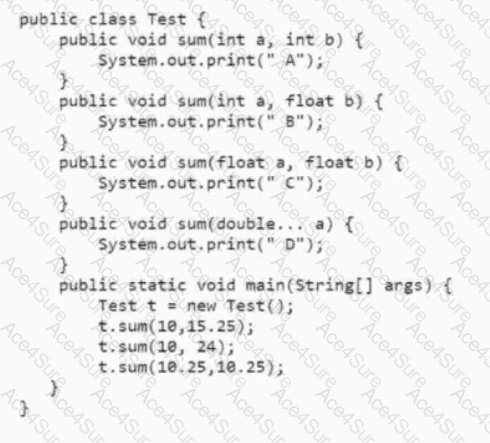The answer is C because the code demonstrates the concept of method overloading and type conversion in Java. Method overloading allows different methods to have the same name but different parameters. Type conversion allows values of one data type to be assigned to another data type, either automatically or explicitly. In the code, the class Test has four methods named sum, each with different parameter types: int, float, and double. The main method creates an instance of Test and calls the sum method with different arguments. The compiler will choose the most specific method that matches the arguments, based on the following rules:
If there is an exact match between the argument types and the parameter types, that method is chosen.
If there is no exact match, but there is a method with compatible parameter types, that method is chosen. Compatible types are those that can be converted from one to another automatically, such as int to long or float to double.
If there is more than one method with compatible parameter types, the most specific method is chosen. The most specific method is the one whose parameter types are closest to the argument types in terms of size or precision.
In the code, the following method calls are made:
test.sum(10, 10.5) -> This matches the sum(int a, float b) method exactly, so it is chosen. The result is 20.5, which is converted to int and printed as 20 (B).
test.sum(10) -> This does not match any method exactly, but it matches the sum(double a) method with compatible types, as int can be converted to double automatically. The result is 10.0, which is printed as 10 (A).
test.sum(10.5, 10) -> This does not match any method exactly, but it matches two methods with compatible types: sum(float a, float b) and sum(double a, double b). The latter is more specific, as double is closer to the argument types than float. The result is 20.5, which is printed as 20 (D).
Therefore, the output is B A D. References:
Oracle Certified Professional: Java SE 17 Developer
Java SE 17 Developer
OCP Oracle Certified Professional Java SE 17 Developer Study Guide
Method Overloading in Java
Type conversion in Java with Examples
Java Method Overloading with automatic type conversions

